Spray Paint vs. Brush Hand Painting on Interior Doors
Painting your interior doors is such a simply way to update your home. You can modernize your home with a fresh coat of white paint, or personalize your interior doors to your design style with a pop of color. It is an affordable option, as well, for beginner DIY home improvement! Here is a complete guide to painting interior doors with spray paint vs. brush methods.
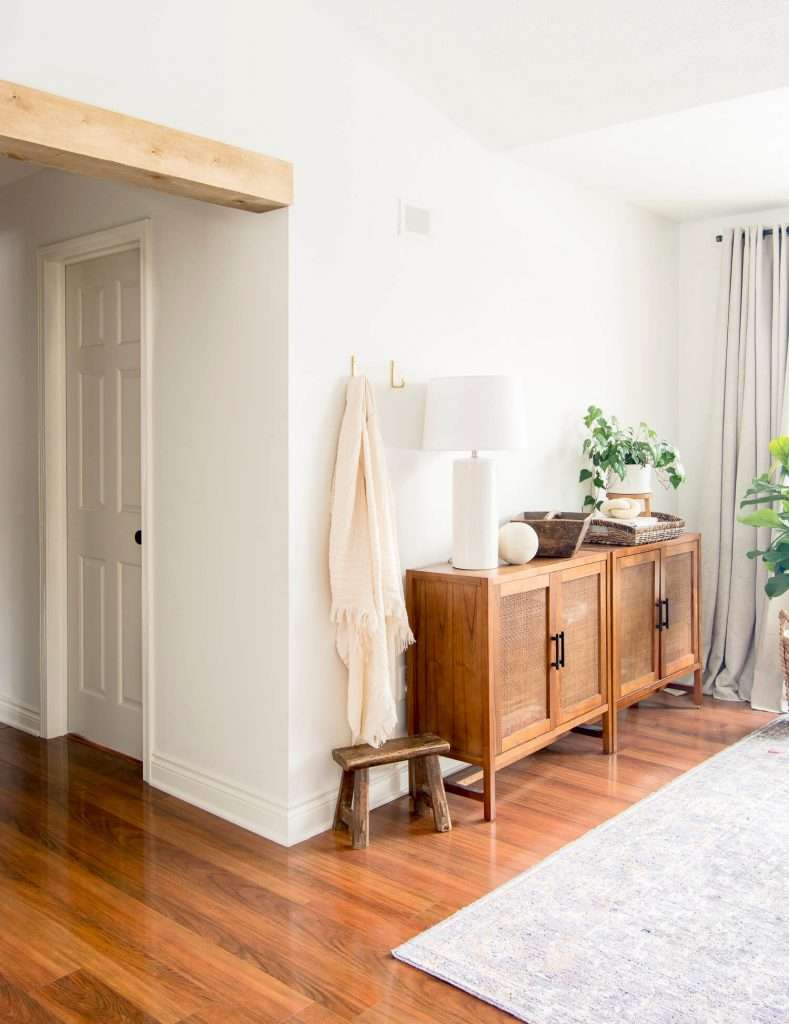
This post may contain affiliate links where I earn a small commission on your purchases at no additional cost to you.
What is the best way to paint interior doors | Spray paint vs. brush?
When we moved in to our home, orange honey oak wood doors overwhelmed me. There was honey oak everywhere! This popular 90s wood color was on the trim, doors, floor, mantel, railings, and walls. Though the warm wood tones are something I enjoy, I didn’t enjoy them to that extent. It was wood overload.
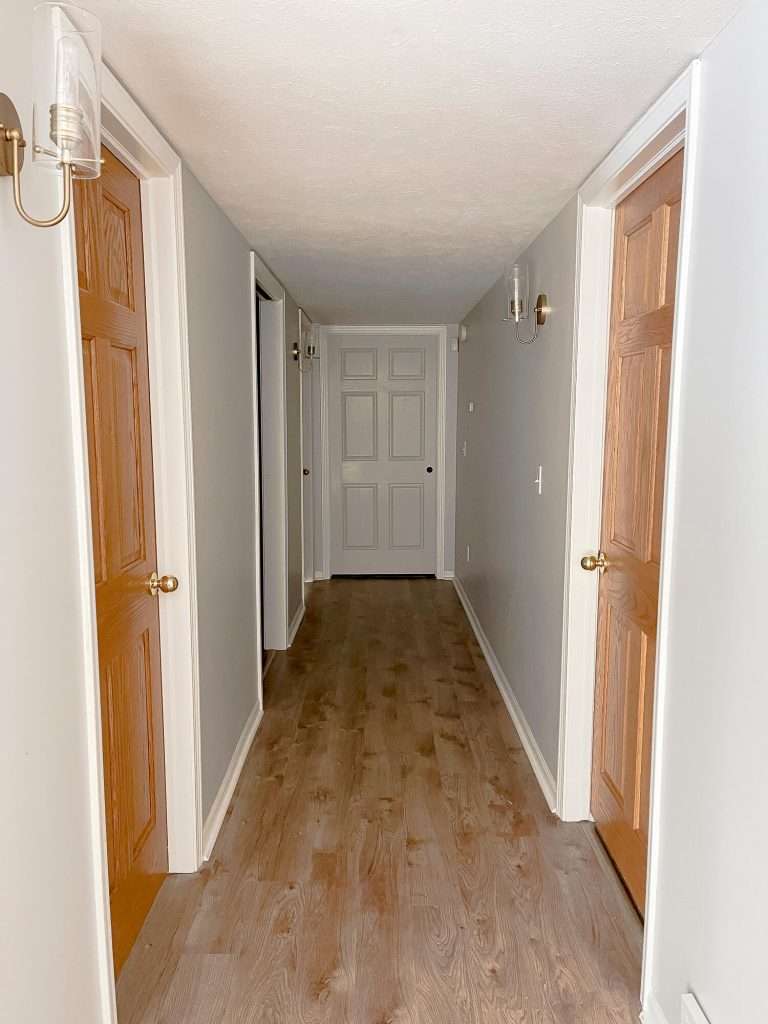
Over the last three years, we have slowly eradicated the honey oak color with paint. You can see some of that process through the articles below.
- How to Modernize a Home With Painted Trim
- How to Paint Windows Without Tape
- How to Paint Trim Without Brush Strokes
- How to Paint Interior Doors with a Paint Sprayer
And the last wood standing is our honey oak doors! These doors are extremely solid, well made doors. Even though the 6 panel door is less in style than more modern interior doors, I wanted to keep them because of the high quality. So, in order to update them I painted them!
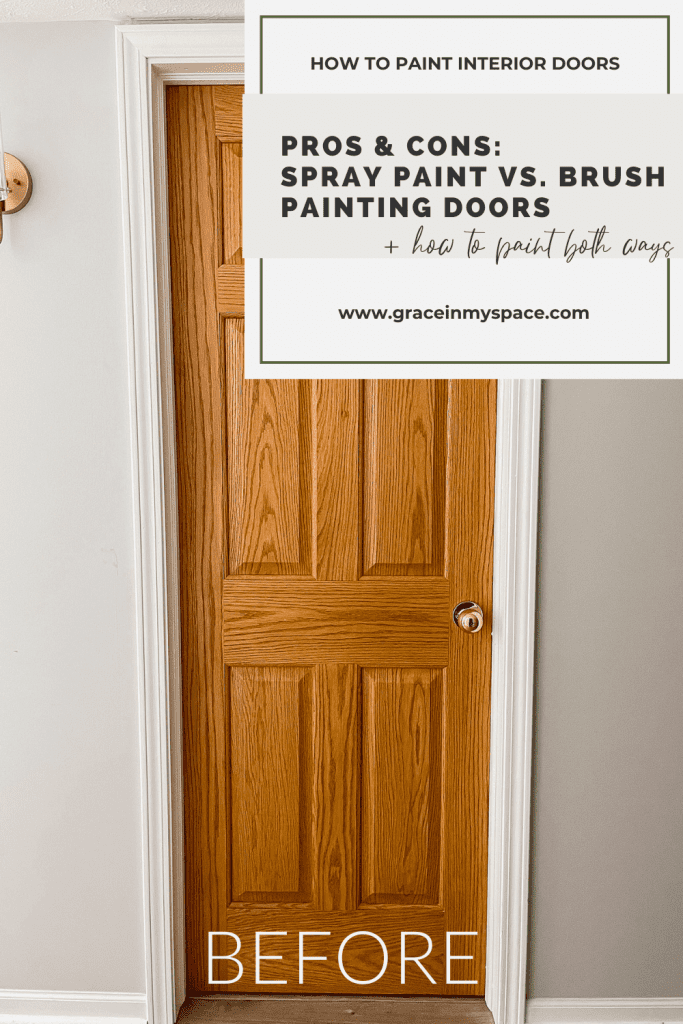
I’ve painted doors a few different ways: spray paint, hand brush and rolling. So I’m often asked, what is the best way to paint interior doors. This article will be a complete guide to two options that I think are the best way to paint interior doors: spray paint doors and hand paint doors.
What kind of paint do you use on interior doors?
No matter what method of painting you use on your doors, there are certain prep steps and products that will give you the best finish. Using the appropriate type of paint for your interior doors makes a huge difference in the finish and durability long term.
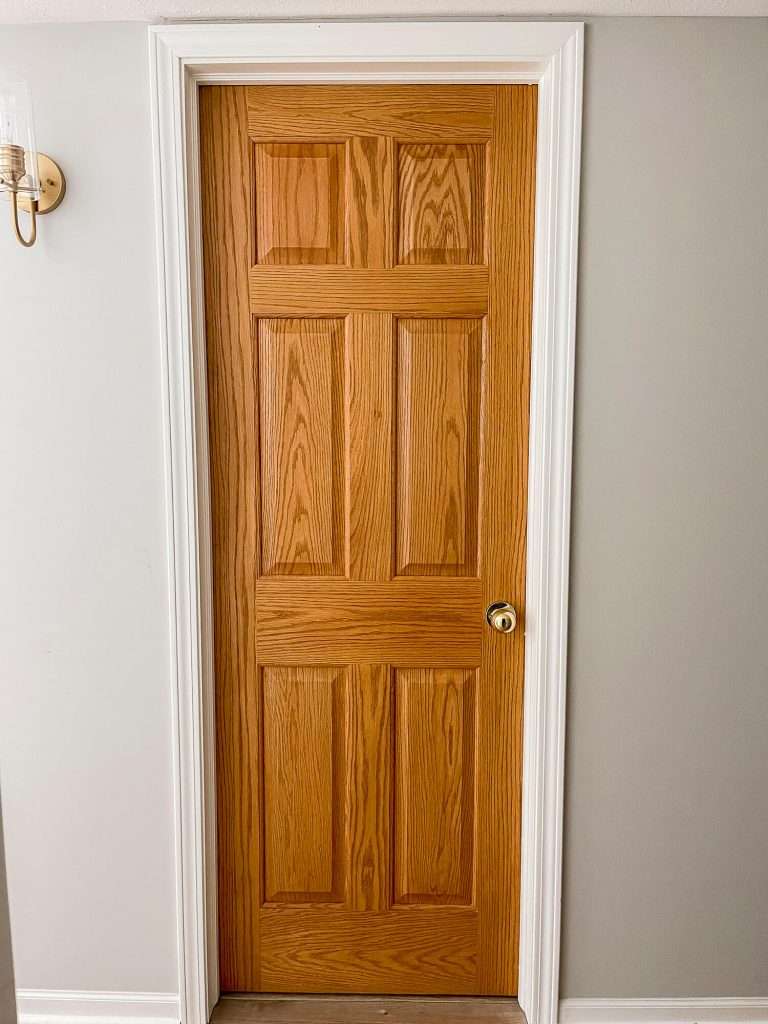
Many people are hesitant to paint interior doors because they don’t want to deal with chips and upkeep. However, using a high quality paint and proper preparation will give you a beautiful finish for years to come with minimal upkeep.
Best Paint for Interior Doors and Trim
The best paint for interior doors is similar to what I would choose for trim. Any of the following types of paint will work wonderfully for your interior doors. They each have their pros and cons so it is up to you which you choose for your project!
Using oil based paint on doors
Oil based paint is an amazingly durable paint option which is perfect for painting doors. Once painted, your doors will clean up well, be extra durable, and have the smoothest finish.
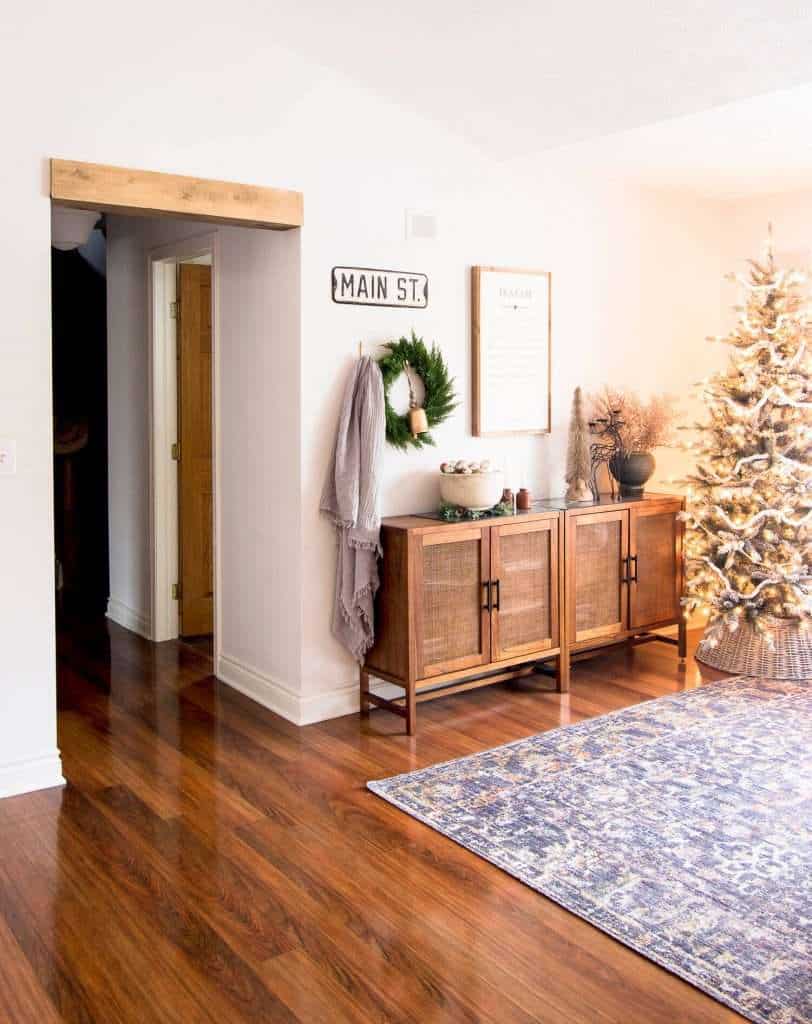
However, the cons of using oil based paint for interior doors often causes people to opt for latex. Oil based paint is odorous and is a more time intensive clean up. Plus, once you’ve painted with oil based paint, you should not paint overtop with latex as it won’t adhere well. So once you’ve chosen oil based paint for your doors, you’re all in!
Using latex paint on doors
While oil based paint will give you the smoothest finish due to it’s longer drying time, many quality latex paints will offer great results! As the painting industry continually improves, you’ll find that latex paints are more versatile and durable than ever before.
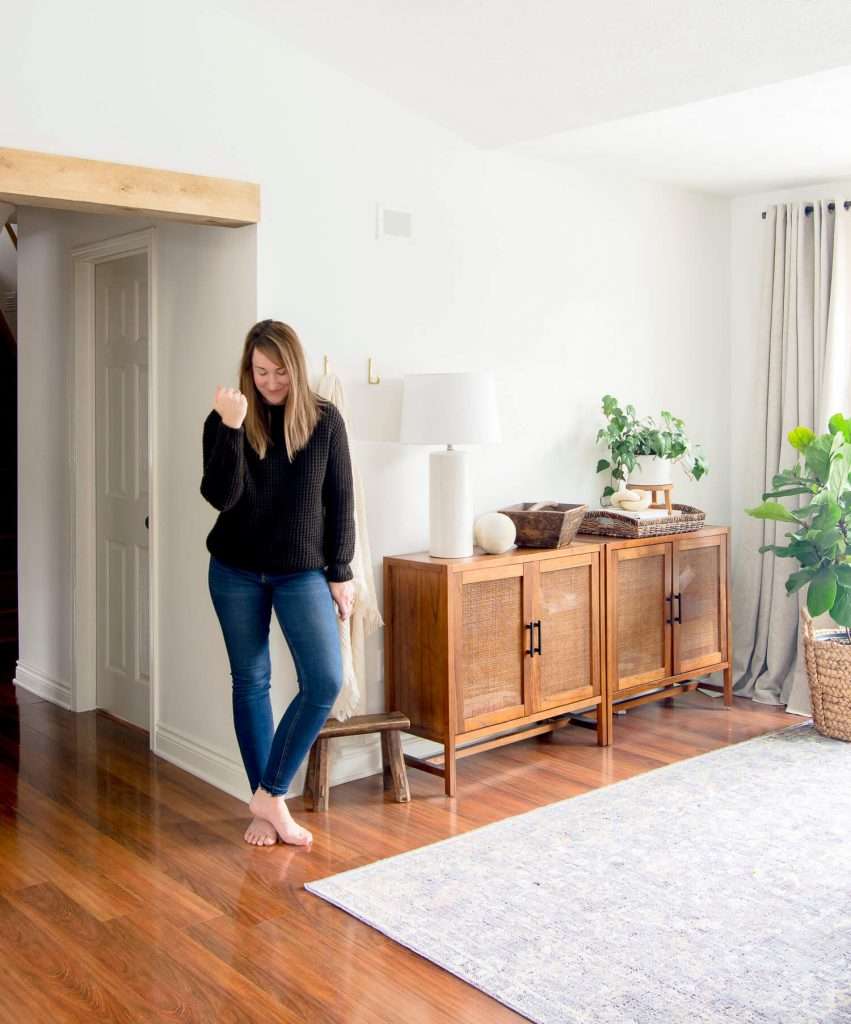
If you choose to use a latex paint, start by making sure it is a reputable paint brand. Then, for an extra smooth finish, consider adding a latex paint conditioner like Floetrol. This is optional, but adding a paint conditioner slows drying times for latex paint to make it more comparable to oil based options, but without the hassle and odor.
Using ceramic enamel or urethane alkyd paint on doors
I’ve grown very fond of using ceramic enamel paint on trim and baseboards, and that has extended to doors as well. It comes in a semi-gloss or satin finish and dries to a hard, durable finish. It dries quickly and offers easy clean up. Our painter introduced me to this type of paint two years ago and it’s been my go-to choice of paint for areas that I need high durability since!
Another similar option is Urethane Alkyd Semi-Gloss Enamel. This provides a similar finish to oil based paint, but with water clean up. It is one of the most durable finishes and can also be painted on metal.
Using cabinet & door paint on doors
Of course, they basically make paints for almost any specific surface these days! So don’t overlook the value of a paint made specifically for cabinets and doors. These are formulated specifically for a high traffic area and will offer great clean up and a long lasting finish.
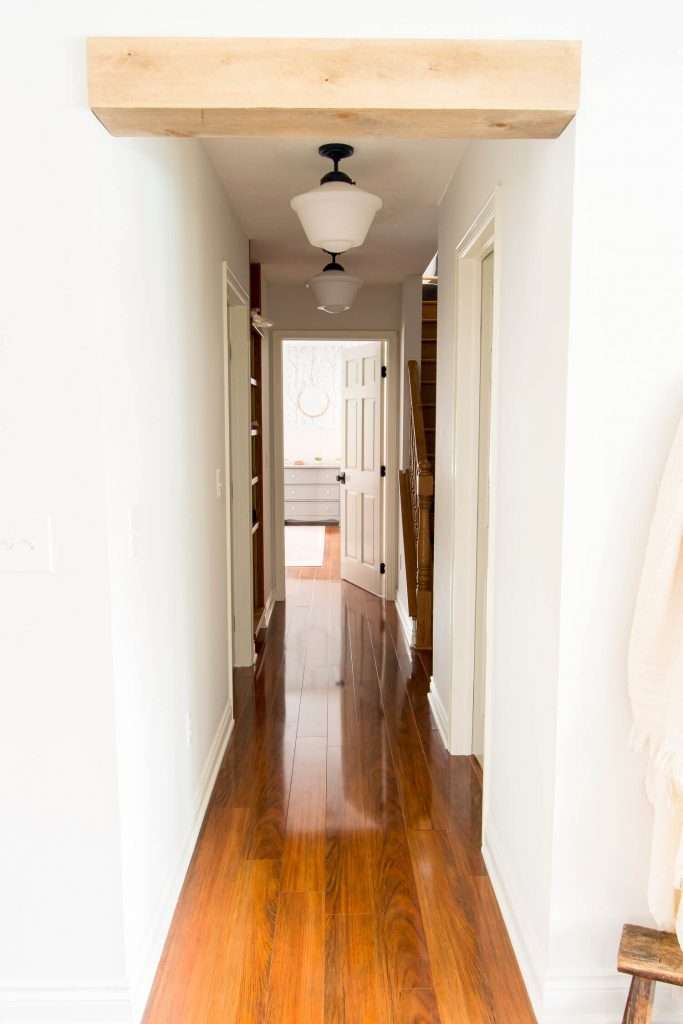
For my interior doors, I chose to use Magnolia Cabinet and Door Paint found at Ace Hardware. Our door color is called Gatherings.
I used this same brand for my kitchen cabinets and backsplash. You can see how I updated my entire kitchen with paint in these articles!
What is the best paint finish for interior doors?
Once you’ve chosen your type of paint, next you will need to decide what finish you want on your doors. I don’t recommend using anything less than a semi-gloss for interior doors. Semi-gloss or gloss provide the best durability for high traffic areas. If you are really opposed to a gloss, some of the enamel or alkyd paints may come in a satin finish that would be the next best option.
And if you are new to painting, make sure to download my free guide to paint finishes! This gives you a breakdown of all the paint finishes available and where to use them.
Cost to Paint Interior Doors
Since I love low budget projects that make a big impact, painting interior doors is one of my favorites! Paint is such an affordable way to modernize a home and it is extremely economical compared to many home improvement projects.
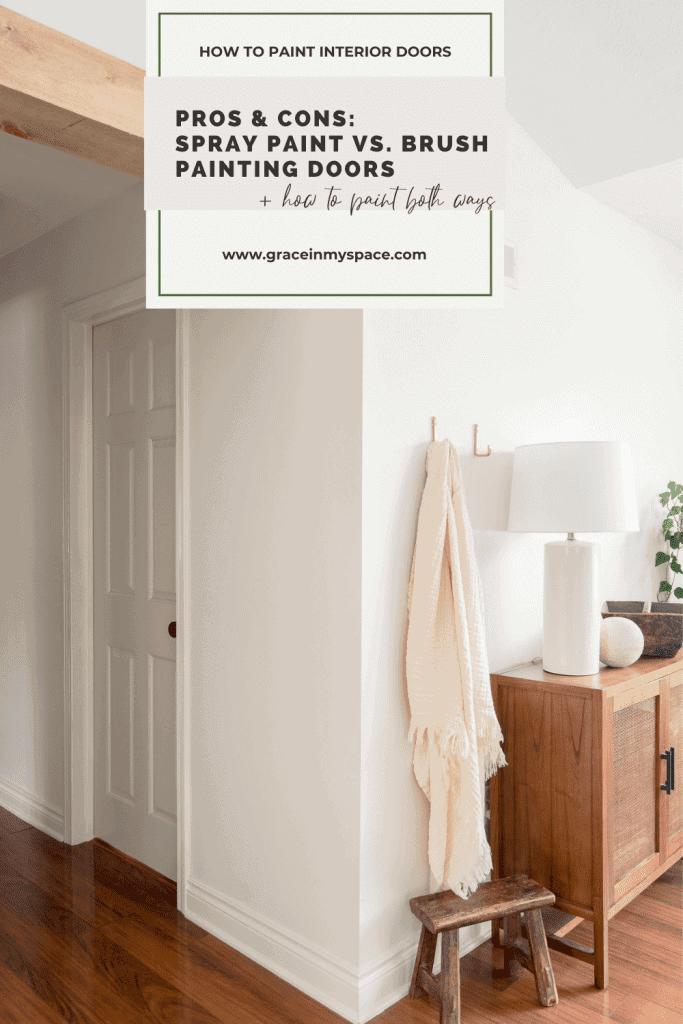
Your cost to paint interior doors and trim, if you choose to extend it past the doorway, depends on the following factors:
- How many doors you are painting.
- What type of paint you choose, as they are all priced differently.
- If your doors are already painted or not. If they are already painted you may not need to buy primer.
- The method of painting, spray paint vs. brush, that you choose. Spray painting uses more paint than brushing.
- Materials you already have on hand.
I paint a lot, so I already have a paint sprayer, brushes, and materials for the prep work. I am painting 11 doors and bought 1 gallon of primer and 1 gallon of paint, plus a deglosser, and spent under $100.
So depending on all of the above factors, you can spend anywhere from $100-$400 (if you need to buy a sprayer!) to paint a LOT of doors!
Painting Indoor Doors | Prep Steps
Proper preparation is absolutely essential to painting interior doors. Whether you are using spray paint vs. brush hand painting, the preparation steps are the same. The first step is to clean your doors thoroughly using soap and water. Or, if you have very dirty or grimy doors, use a stronger cleaner like TSP.
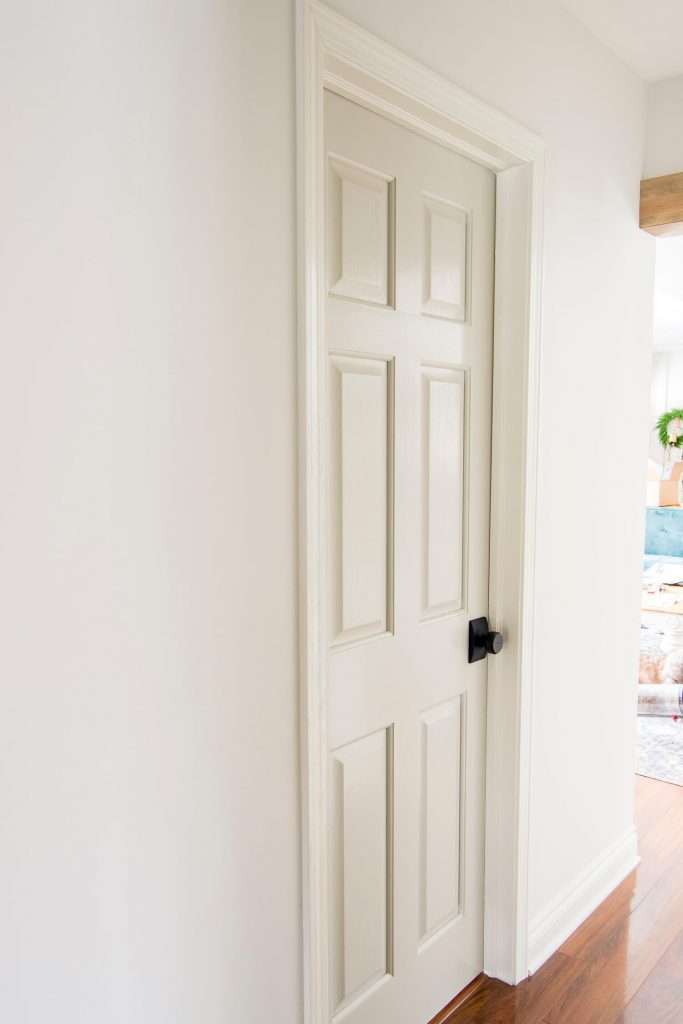
Do I have to sand a door before painting?
The million dollar question: Do I have to sand before painting? I get it. No one likes to sand. It’s time consuming, tedious, and messy! But sanding is an important step to painting doors. It removes shiny and slick surfaces and gives a great base for paint to adhere to.
However, if you’re like me and have long winters, sanding outdoors isn’t always the best option. Since I don’t want to sand indoors and create a huge mess in my home, I like to use a deglosser. This is an alternative to sanding. You simply wipe it on, let it sit, and then wipe it off with a damp rag. That’s it!
It is a tedious process, just like sanding, but much less messy and often an easier option for getting into small crevices and grooves.
Once you are done deglossing or sanding, make sure to wipe down the doors once more to fully clean any residue off.
Then, the final preparation step is to prime.
Priming Interior Doors | Necessary for both Spray Paint vs. Brush
Priming doors is very important if you are painting over wood that has never been painted before. I recommend an oil based primer, or something with excellent coverage like Kilz 3 if you don’t want to deal with oil based.
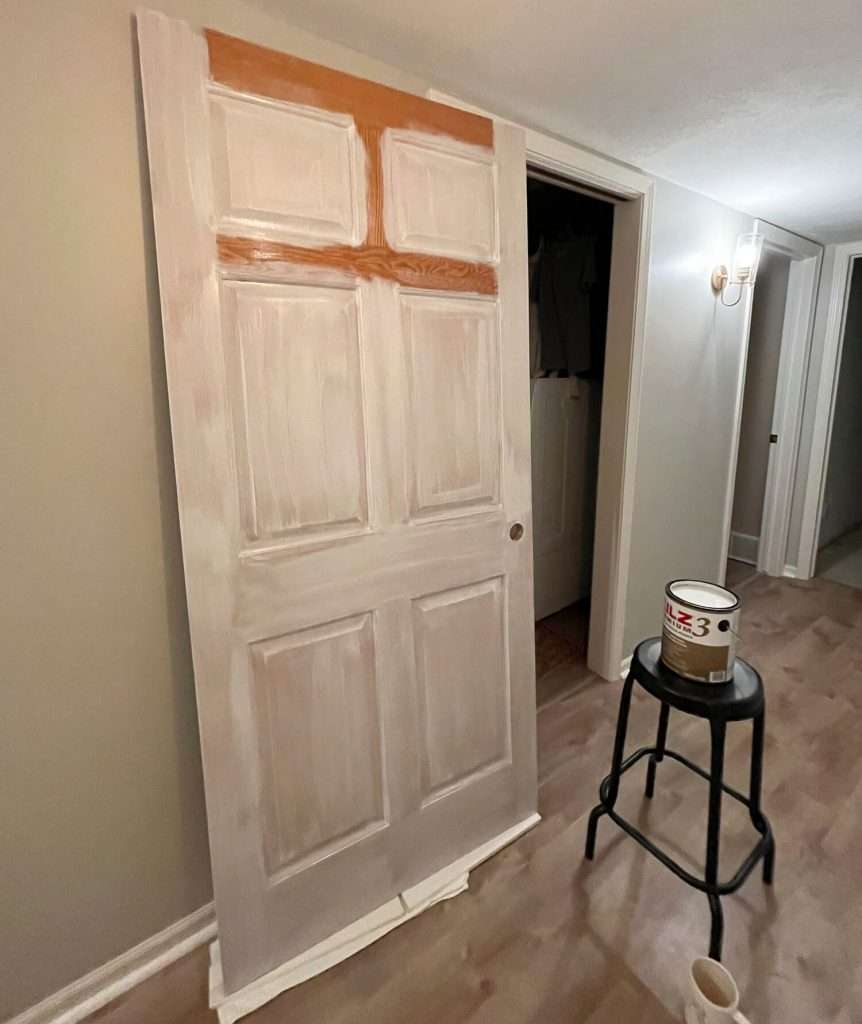
If you are painting an already painted door, you may still want to use a primer. If you are going from a dark color to a light color, then priming will help you have better coverage with less coats of paint.
Similarly, if your door has damage or uneven surfaces, then repairing that and then putting a coat of primer will help the finish look best in the long run.
Can you paint a door without removing it?
The short answer, yes! If you are hand brushing your door it is possible to paint it while it is still on the hinges. Simply tape off the hinges with painter’s tape to prevent them from getting painted accidentally.
Then, you can choose to tape or remove your door knob and latch plates for the same reason.
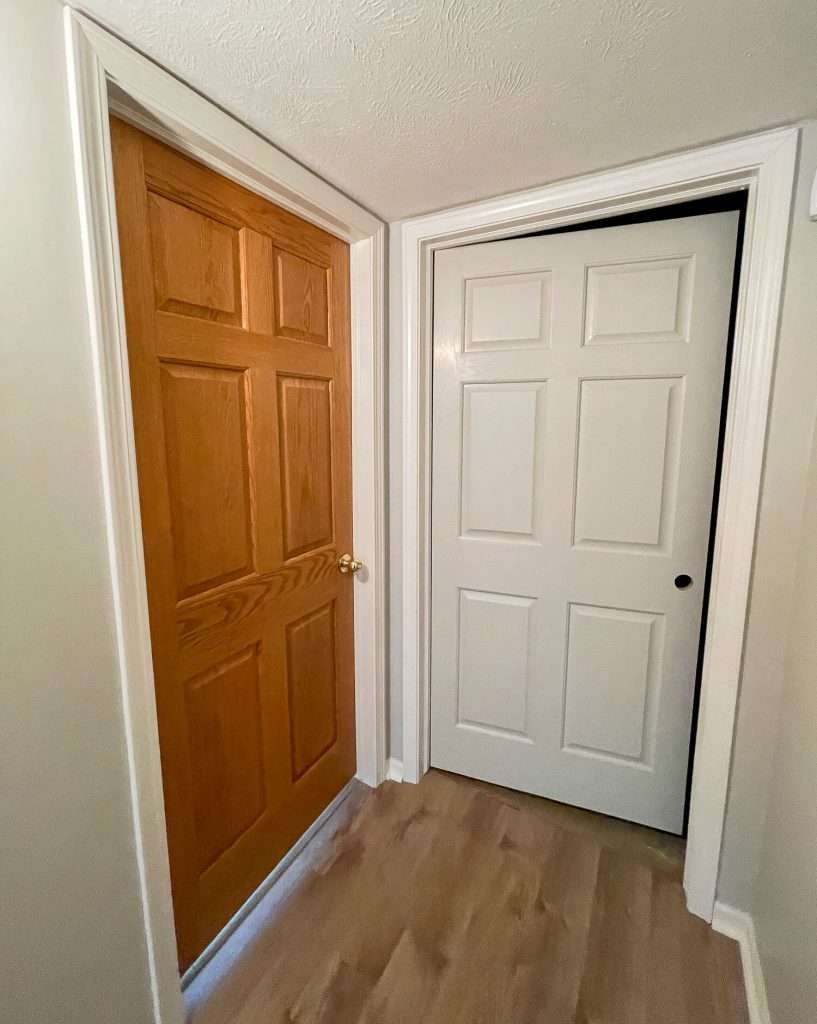
While I am painting my interior doors, I thought it would be the perfect time to also update our hinges and door knobs! We had the classic 90s style shiny brass hinges and knobs that had scratches all over them. So I chose these beautiful matte black hinges and knobs to bring our doors into the current style!
- Privacy Knob with lock
- Passage Knob with no lock
- Matte black hinges (Make sure to determine what style hinges you currently have so the new ones fit!)
Spray paint vs. brush methods
And now, we get down to the big question: is it best to spray paint vs. brush, or hand paint, my interior doors?
Honestly, there are pros and cons to both! So rather than say that one is better than the other, I’ll give you the break down and let you decide. Then, I’m going to share some tips for using both methods.
Hand painting interior doors
Hand painting interior doors is easy, but time consuming. It allows you to paint the doors where they are without moving them to a place that is acceptable for spraying, and it is a convenient way to paint a handful of doors or less.
Pros:
- Convenient for those without a paint sprayer
- Easy to do quickly for 1-3 doors
- Less prep work to prepare a space for painting
Cons:
- Time consuming if you have a lot of doors to paint: 30-40 minutes per door, per coat, hands-on time
- Harder to get a smooth finish.
- Tedious and taxing
What type of brush is best for painting doors?
If you choose to hand paint your doors, make sure to use the proper materials and preparation above. I like using a 2 inch angled brush with a short handle. This brush is my favorite for painting doors and trim.
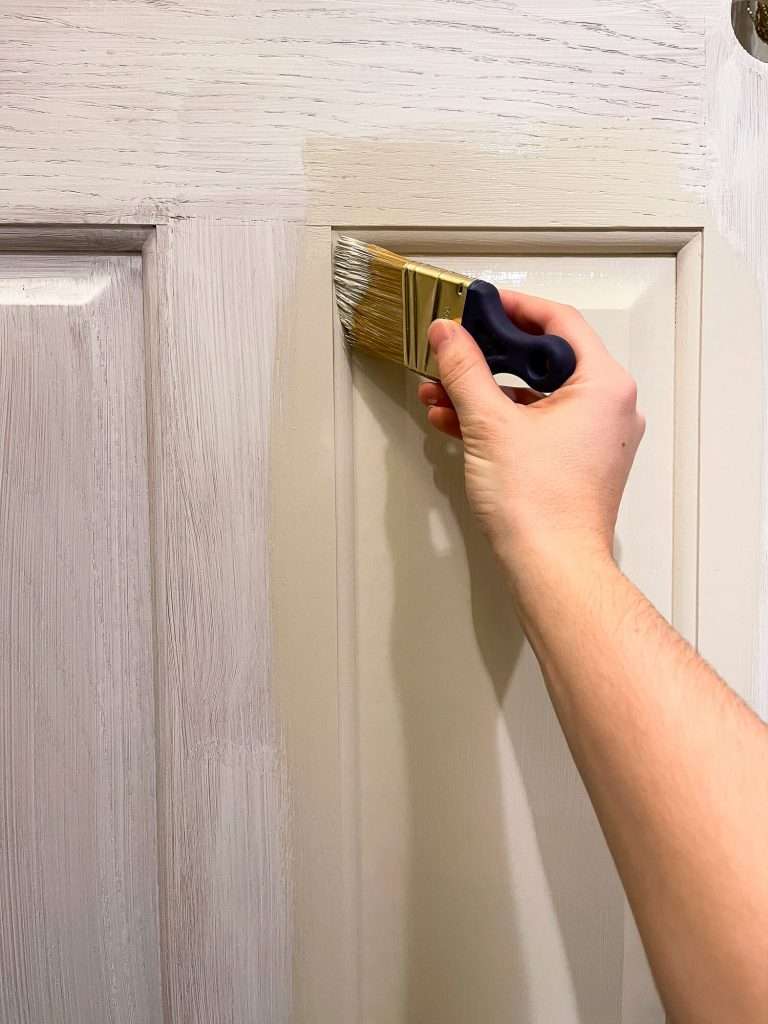
How do you paint interior doors without brush marks?
I recently wrote an entire article all about how to paint trim without brush marks. The same methods apply to painting doors! You can read the entire article here. However, here are a few quick tips for painting doors without brush marks.
- Paint in small sections. Especially when painting a 6 panel door. Think of the door in thirds. Do the bottom two panels, then the flat surfaces. Next, do the middle panels, then the middle flat surfaces. Then, do the top panels, then the flat surfaces. Finish by painting the vertical side flat surfaces and edges of the door.
- Don’t over brush. Paint is meant to self-level so if you brush through it too many times it will become thin and show each brush stroke more heavily.
- Don’t put a brush into partially dry paint. Always start your stroke at the top and go all the way to the bottom and feather out where needed. Using additives like Floetrol in latex paint, will help keep your paint wet longer so it is easier to work with.
Spray Painting Interior Doors
Spray painting interior doors, like brushing, has its own pros and cons! It is much faster for the actual painting, but requires more preparation. Plus, cleaning your paint sprayer is extremely important and can be time consuming.
Pros:
- Very fast method of painting: 3-4 minutes per door hands-on time
- Smoother finish if using a quality sprayer.
Cons:
- Time consuming prep work.
- Paint sprayers can be temperamental and clog easily.
- Time consuming clean up of the sprayer.
How to Prep for Spray Painting Indoors
Just like with sanding, most of my spray painting is done indoors. I was able to move my closet doors outside when I used a paint sprayer on them in this project. If you’re able to paint outdoors, your preparation work will be much less intensive!

For those of us who need to paint indoors, there is a lot of prep work that goes into it.
- Use plastic to cover all surfaces within 10 feet of your spray area. Floor, ceiling, walls….everything! The paint dust will travel, so over compensate on your protection.
- Tape down all the edges of your plastic so they can’t float. Your paint sprayer may use air to spray the paint and this draft can cause lightweight plastic to float, and ruin your paint job!
- Spray in a properly ventilated area and use an appropriate mask and eye protection for yourself while painting.
How to Spray Paint Interior Doors
Spray painting interior doors is very similar to how I use a can of spray paint. It’s all about the paint velocity and continuous motion. This tutorial on how to use a paint sprayer on interior doors goes into more detail, but here are the highlights, as well as an example of a good and bad spray painting job.
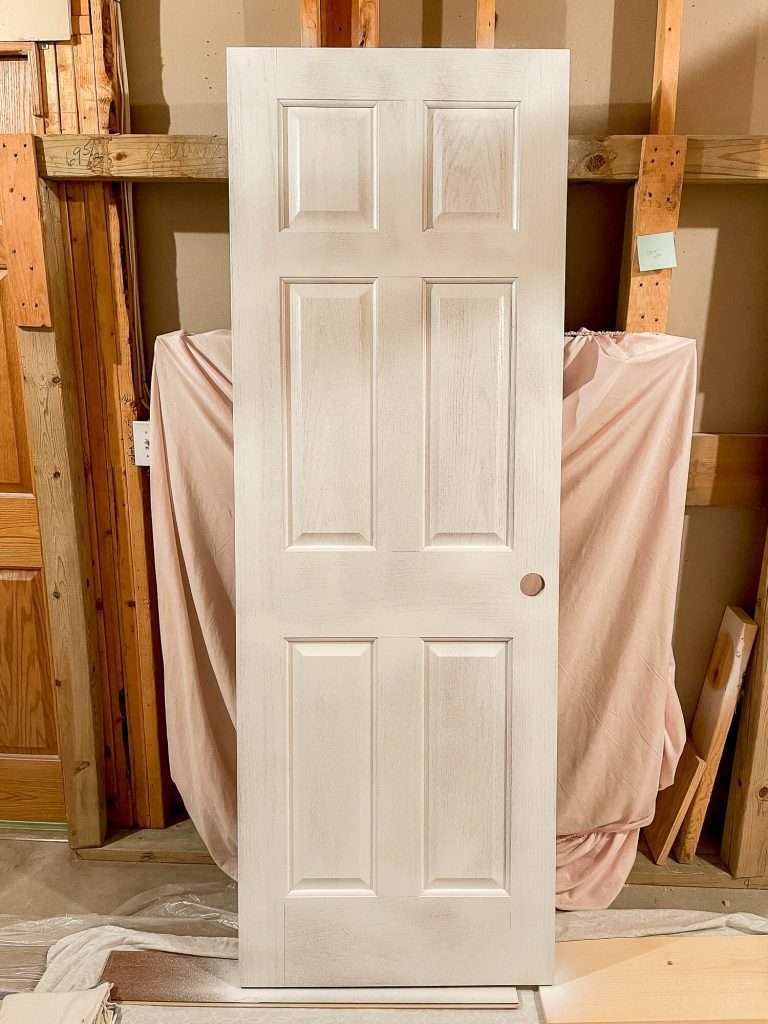
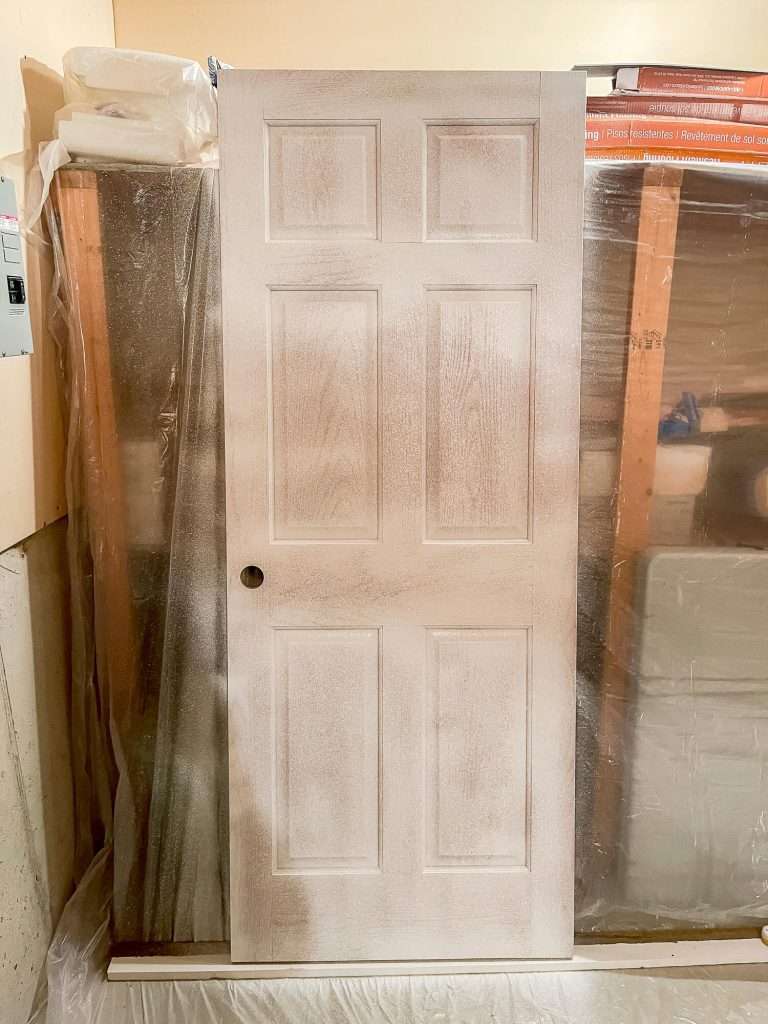
- Practice your spray technique on a scrap piece of wood first to get the movement and proper velocity down.
- Clean your sprayer nozzle periodically while spraying to avoid it getting clogged, causing spotting and an uneven finish (see image below).
- Start your spray off the door and gradually come onto it, using a continual motion up and down the door with a small overlap. Never stop moving while the paint is on the door!
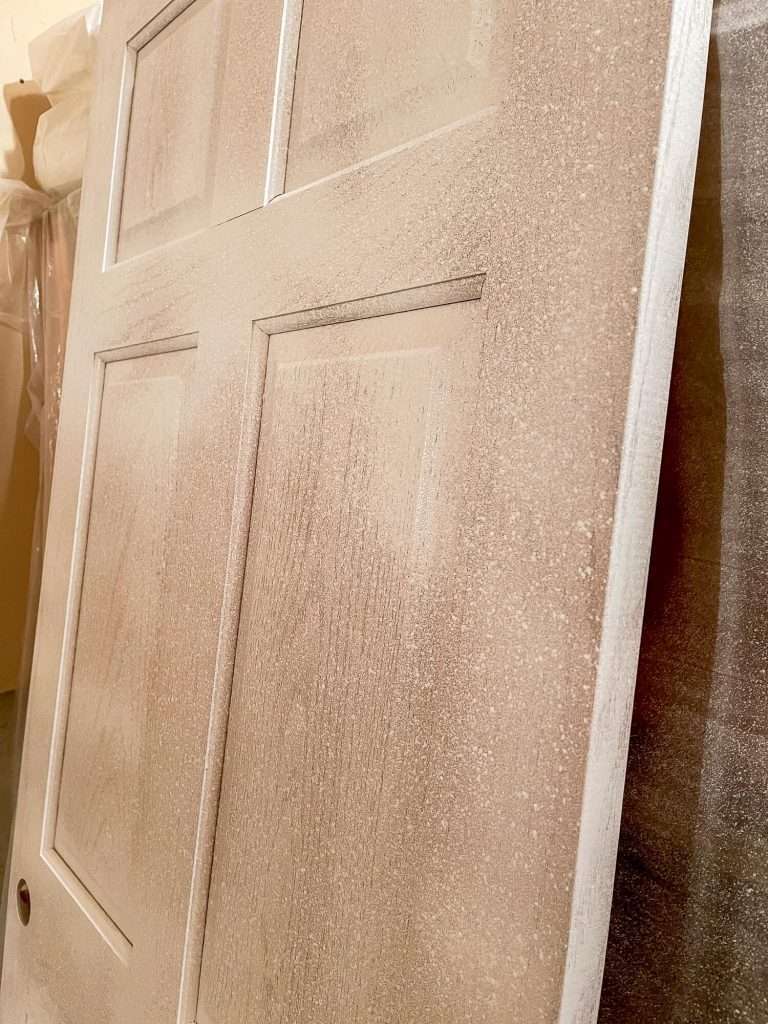
If your sprayer starts to spit, rather than spray, it may be because of any of the following reasons:
- Clogged nozzle
- Improper cleaning, causing chunks to come through
- Paint that is too thick
- Wrong pressure and spray pattern settings
What is your conclusion: spray paint vs. brush?
Now that you have all of these facts, what is your conclusion? I personally prefer the speed of spray painting, but more often than not the ease and convenience of hand brushing wins for me! Plus, it is nice that it can be done on the hinges if a door is heavy to move, like ours are.
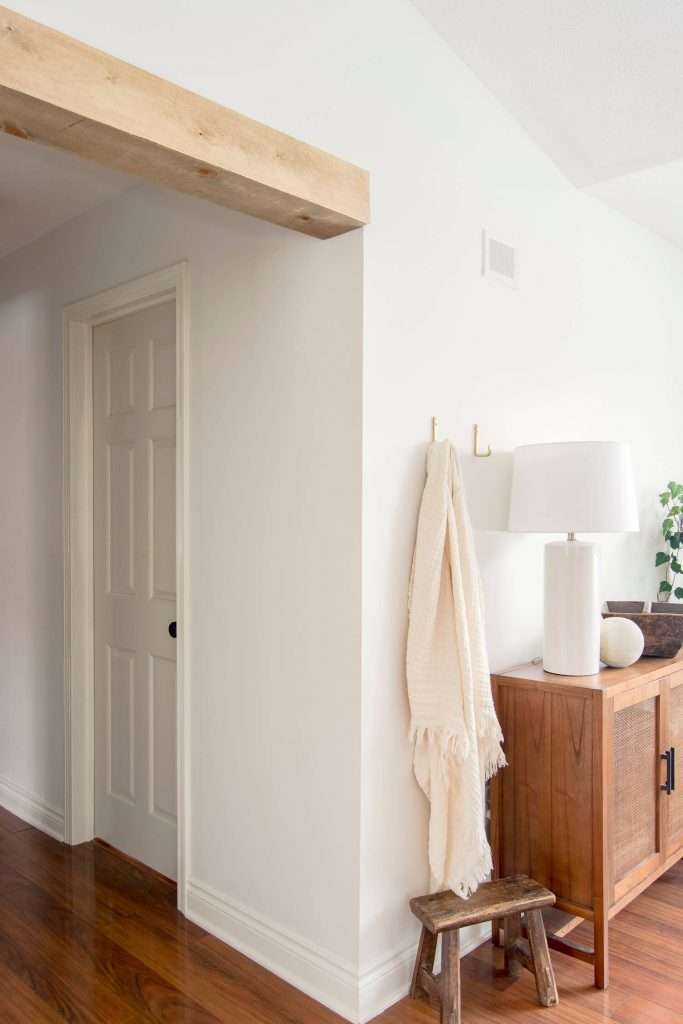
Stay Connected
I hope this post on spray paint vs. brush painting doors has been helpful to you! Make sure to share this post and pin it for later when you’re ready to paint your doors!
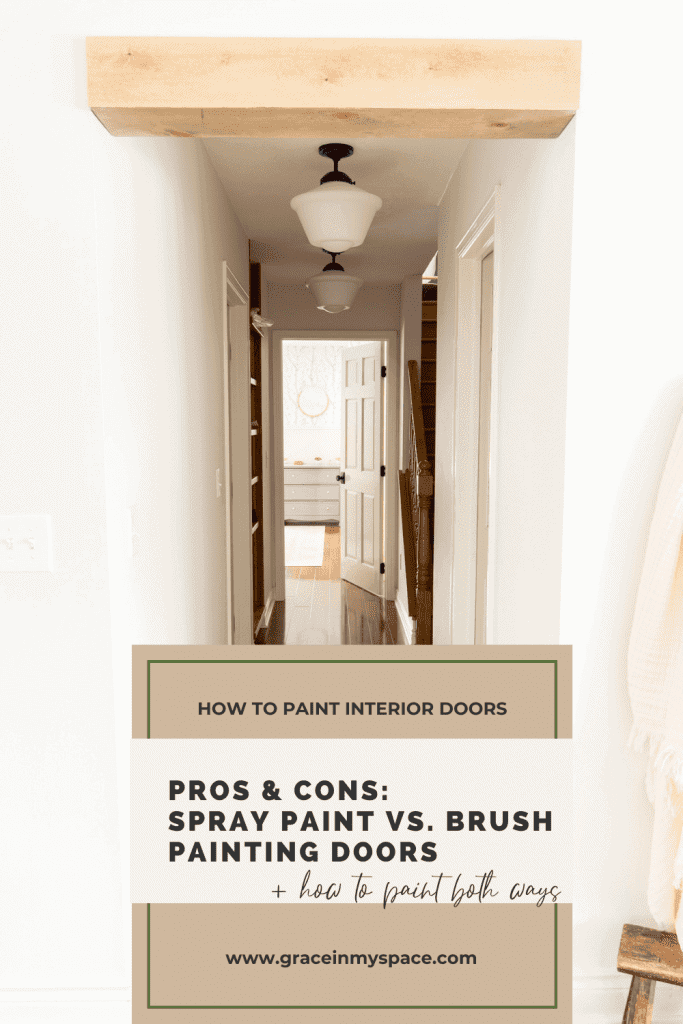
If you’re looking for more affordable ways to update your home, make sure to check out these 15 beginner DIY home improvement projects!




Painting your interior doors can be a simple yet effective way to refresh your home’s look. Whether you opt for a classic white coat for a modern touch or inject some personality with a splash of color, it’s a budget-friendly option for DIY home improvement enthusiasts. In this guide, we’ll explore the differences between using spray paint and brush hand painting methods for your interior doors.
Doesn’t the paint have to be water based though if you what to spray it?
Commercial sprayers can handle oil based paints. It just depends on your sprayer.
What sprayer do you like?
Sorry if I missed the mention or link
This was a great article! How did you decide to do a color versus your trim color on the doors? I also have honey oak doors throughout my house. But the wood is so forgiving versus the White Dove paint that I painted on my oak trim is already showing the chipped paint from having children bump into it.
I just wanted a contrast from the trim, so it’s totally a preference! I do agree that wood is more forgiving than paint. So it’s definitely a trade off for style preference over practicality in this instance.
Is the door color the same as the wall color? How did you decide wall/trim/door combo?
I didn’t see sanding mentioned. not necessary on wood doors and trim? Just a deglosser if if coated with polyurethane ?
Thank
My doors were rough enough with just the deglosser. If you have a very heavy gloss on yours then sanding as well would be a good addition!
Great post – very helpful – my sister has solid oak 6 paneled doors and she was just saying she’d love to do this. I will be sending this to her.
All the upgrades and updates you have done to your home are really awesome.
Thank you! I hope the tutorial is helpful to her.
Really great post! Extremely helpful
Thank you 🙏🏻